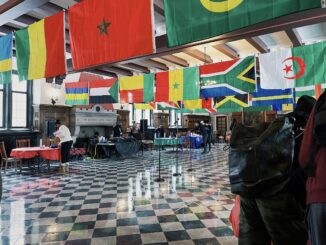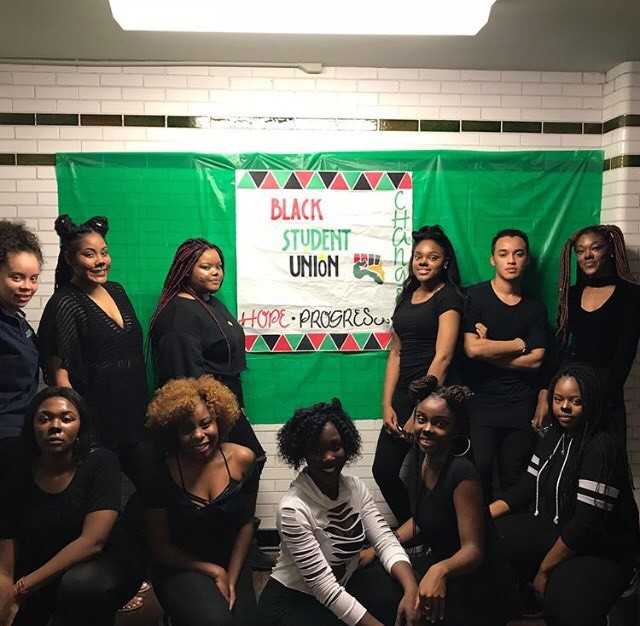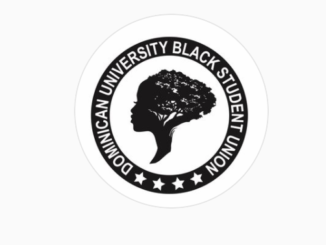
By Chelsea Zhao
President Carroll received a letter advocating inclusion and recruitment of faculty of color and assistance to marginalized, notably DACA and undocumented students, on campus.
Undocumented & Immigration Allyance (UIA) and the Organization of Latin Americans (OLA) co-wrote the letter with some input from Black Student Union (BSU). The letter details a list of needs that the groups hope to be addressed at certain deadlines. It was sent on Tuesday, Nov. 19.
There are nine concerns and suggestions listed in the letter: creation of a multicultural center, hiring of a full-time El Centro coordinator, establishment of a full-time undocumented student liaison, intentional recruitment of colored staff and faculty, hiring of staff with student input, a comprehensive plan to retain staff of color, cultural competency training, comprehensive financial aid policy and upholding Sanctuary Campus Covenant.
The letter was written by UIA President Carlos Benitez, OLA President Mia Sara Mendez, and Patrycia Piaskowski.
The letter notes the lack of staff who represent and understand the experiences and difficulties faced by the Latinx, undocumented and DACA-mented students at Dominican University.
According to OIE Document office, as of fall 2018, Dominican University has 1,167 Hispanic undergraduates, which made up 55.4% of the total student population. As of 2017, there are 14 Hispanic or Latino full-time faculty, which made up 9% of the full-time faculty population.
Carlos Benitez, the 2019-2020 St. Catherine Medal Award recipient and president of UIA, points out the mission of the university as a Hispanic Serving institution (HSI). He said that even though most of Dominican’s students are Hispanic, it is also important to acknowledge systematic oppressions and other issues these students face.
“Having a 55% Latino student body doesn’t solve all the problems,” Benitez said. “Systemic oppression still exists, and your student is still facing systemic oppressions. What are you doing to make sure that this campus is theirs? And you have to ask larger questions like: Is this institution ready for its Hispanic students? Is it ready to identify as Hispanic? Because otherwise it’s just doing it to tokenize the 55% of the student body. More Latino.”
Dr. Lisa Petrov, Title V Director, said she was not informed of the letter. However, she said that she was not surprised when it was emailed to her.
“The list of demands does not refer to one instance. These are ongoing climate things. It’s not like one thing happened, they got angry about it, and they wrote this letter. This is the way things happened in general, so it’s not exactly surprising.”
Additionally, the letter also mentions challenges after the departures of two Title V faculty members and UIA’s need of support to provide services to students in need.
The departures of Fanny Y. López Benítez, the former Title V Project Manager, and Franklin Ortega, the former Title V retention Specialist, left a vacuum in the community.
Title V grant is a five-year development project sponsored by the Department of Education to Dominican University as of October 2017. This $2.75 million grant will “…support activities designed to strengthen the institution’s undergraduate capacities in the three named parts of the project: advising, teacher education and H.S.I. (Hispanic Serving Institution) identity”, according to the Title V page from the Office of Diversity, Equity, and Inclusion.
As of now, the university is looking to hire a Title V Manager. Three demands of the letter note support to faculty of color, hiring with student input, and intentional recruitment of staff of color.
“The question is” Dr. Petrov said, “what are the skills we need staff to have? And on a Hispanic Serving Institution, I argue that we need to have staff that has cultural knowledge, intercultural experience, and frankly, we need more people who speak Spanish on this campus”.
According to Benitez and Maria Marquez, who are both Psychology majors at Dominican University as of Spring 2019, one Hispanic faculty from University Ministry, two Hispanic faculty from the Spanish Department, and two faculty from Title V office have left the university. The reasons of their departures are unclear.
“Other faculty and staff with different ethnicities could have the same thing. However, they are not leaving,” said Marquez. “There has to be a reason behind why five Latinx staff have left in only a year and a half. And we want to know why and what Dominican can do to make sure that we have a representative faculty and staff to what our students are”.
The departure of these faculty and staff could point to issues of prejudice and campus climate.
“There are lots of things that people unconsciously have biases against,” Dr. Petrov said. “If faculty do not speak perfect English and they present themselves as an immigrant, some people automatically think that they [immigrant faculty] don’t know things.”
UIA is one student organization that provides financial help and emotional support to undocumented students. The mission of UIA is to educate Dominican University about experiences of undocumented students.
“I think we’ve been working in close relationships with El Centro because I worked there as the immigration student support assistant,” Benitez said. “That role was created after, you know, me and Fanny kind of pushed for it, because we recognize the need of someone to kind of case manage and to figure that out within more parameters.”
Benitez said he directed students from El Centro to UIA, which offers safe spaces to DACA students and provides financial assistance they need. He described UIA as a family undocumented students can turn to when they encounter obstacles.
“If they are struggling with something of immigration, if they are struggling with a problem with a professor, they know they can come to us and we are going to have their back” Benitez said.
According to Benitez, UIA raised $ 3100 for Student Fund for Immigration Related Emergencies to help students to renew DACA, without which DACA students will not be able to find employment for their tuition or stay in the United States. Part of the fund is also to help legal challenges or crisis such as deportation.
According to National Immigration Law Center, DACA, or Deferred Action for Childhood Arrivals, is a program set up by the U.S. Department of Homeland Security. DACA prevents deportation of youths who came to the United States as children and provides them temporary stay in the country. Since June 28, 2019, U.S. supreme court starts review federal cases that challenges Trump’s termination of DACA.
“It’s not that we struggle with school, it’s the impact that immigration have on our lives,” Maria Marquez said, “We need that emotional support. We need to know that we have people that are going to be there to help us and to give us resources.”
Marquez also pointed out that departments are not prepared to help DACA students. The issues DACA students face is not academic, but financial and legal ones.
According to USCIS’s official website, DACA recipients need to pay USCIS a $495 renewal fee along with Form I-821D. USCIS is not accepting requests from individuals who has not previously received DACA.
“They could talk about, ok, if you were a citizen what you can do next,” Marquez said, “but what if DACA gets rescinded in a month or two?”
The presence of student organizations uplifts DACA students, but the letter said that a Multicultural Center would create a space for all marginalized students. The idea and premise of this center is present in many student organizations.
“It [UIA] is completely student run, completely student-led, which is another big thing of the fund, it’s students doing things for students, and we hope to institutionalize it,” Benitez said.
The Sanctuary Campus Covenant protects privacy of immigration status, support community members with resources, protects rights of community members when engaged by law enforcements, and exercise conscience for a safe and inclusive campus.
Front Door Team is one establishment that is trained in sanctuary campus policies and practices.
Dominican University has also been partnering with PASO, (Proyecto de Acción de Los Suburbios del Oeste). PASO provides legal support to immigrants. They offer services such as removal defense, visas, applications for permanent residence, etc.
The extent of this partnership is limited. According to Benitez, PASO is undergoing changes to advocate on policy changes. The need of a staff member who can connect students to resources and cope with drastic changes from Supreme Court’s ruling of the DACA case is essential to the DACA students at Dominican University.
According to National Immigration Law Center, U.S. Supreme Court will issue its decision on DACA anytime between January and June 2020.
“What’s going to happen when there’s 200 students in crisis because of what’s going on?” Marquez said, “There isn’t going to be a place where we could go and get the proper support. And if there is, how informed is the staff and faculty of what’s going on.”
According to Benitez, undocumented students have been frequently “outed” without their consent. Benitez said violations of the Sanctuary Campus Covenant “at least costs student disturbance or uncomfortableness, but at the most, it could put them into potential danger”.
Thus, the last demand of the letter is to ensure that all offices and departments uphold and comply with the Sanctuary Campus Covenant.
According to the letter, a review of the policies and practices should be done by the Undocumented Student Liaison with support of Chief Diversity Officer, Dr. Sheila Radford-Hill and Vice President of Student Success and Engagement, Dr. Barrington Price.
“I think the idea [Sanctuary Campus Covenant] has been put in place,” Benitez said, “but I don’t think the practice is, the trainings, the ongoing resources, the capacity-building of these resources has been put into action. There has been this idea of cultural competence, I don’t think it has been successfully implemented”
The need of an inclusive campus and a welcoming climate is ensured by the university and everyone in it.
“Anything that happens on the campus, I think the campus is responsible for it,” Dr. Petrov said. “If the staff members are not being collegial, then it’s the institution that is responsible for maintaining an appropriate climate. When we talk about climate on campus, that’s everybody’s job”.
Dr. Petrov attended a training workshop for the DREAMzone Ally Certification Program on January 30, 2015. This workshop was offered by Illinois Dream Fund and detailed terms, defined barriers facing undocumented students, and composed resources for undocumented students for staff and faculty.
BSU supported the list of demands but choose not be co-signers. Cayla Weldon, president of BSU and supporter of the letter, said she agreed with the letter’s demand to recruit people of color, but she thinks the Village offers the support intended by El Centro.
The Village is a place of academic peer advising and social support for African American students. The Village Coaches act as mentors to African American students to adapt to the university environment.
Weldon said that the Village has been working for BSU and saw no reason to change it.
There was no conversation about the multicultural issues facing Dominican University between OLA, UIA, and BSU supporters. Weldon said that BSU will consider cooperation when the demands of the letter is more comprehensive.
“We don’t want agree to it [Letter of Needs to Donna Carroll] because it isn’t fully organized,” Weldon said. “They [signers of the letter] didn’t really have a set way of doing anything. It was just like this big idea. We said, well, until you come up with the actual bits and pieces that aren’t there, we can’t agree with it”.
President Donna Carroll, Dominican University President, appreciated the letter’s clear outline of needs.
“So what UIA and OLA have done in this letter is to help us identify and prioritize what we need to do now” President Carroll said, “and to me, what is most significant to me about this letter, in addition to the content, was the thoughtful and collaborative way it was written.”
Dr. Barrington Price, Vice President of Student Success and Engagement, said that his goal for 2020 Spring is to have groups gather and talk about “the shared plight of African Americans and Latinx students on this campus.” He hopes that the students would be the driving force for the conversation.
“So, talking about these things will lead to a collective understanding among those groups of how we define the goals, operationalize the goals of a multicultural center,” Dr. Price said.
“To make change, it will be the students working across each other’s differences in the way that the whole society needs to work” Dr. Petrov said, “So the LGBTQ students, the Black students, the Asian students, the disabled students – I mean, all of our student groups that are a segment of our population should be at the table, having the conversation”.
Some of the deadlines in the letter of demands have been already implemented. The descriptions for the opening positions have been adjusted after conversation with UIA.
Mia Mendez, president of OLA and one of the authors of the letter, said that due to the fiscal budget already in place, some deadlines have to be pushed back. Mendez said that in the meeting after the letter was sent, the most likely achievement is the multicultural center.
Dr. Sheila Radfrod-Hill, Chief Diversity Officer and Title IX Coordinator, said that clear objectives need to be in place for the multicultural center to be successfully implemented.
President Carroll said that the deadlines motivate university to address the needs of the student collectively.
“Truthfully, I didn’t look at the deadlines as demands,” President Carroll said. “I looked at them as statements of urgency that the university will respond to as well as we can, as immediately as we can, and as collaboratively as we can. That was my response to the group, and I meant that sincerely.”
Mendez said that the letter would encourage other students to be vocal about their needs. “Because at the end of the day the university is here to serve us, the students,” Mendez said. “So I hope this will give some students the push to speak up and have their voices heard.”
Dr. Petrov said that students should engage in conversations for an inclusive campus and not turn away from difficult conversations.
“In this case, they [OLA and UIA] are really speaking about what is typically considered a minority population,” Dr. Petrov said. “But I don’t know how much longer minority will be a minority. So why are we even thinking about that?” From her words, it is clear that Petrov wants to strive to make Dominican better for everyone.



